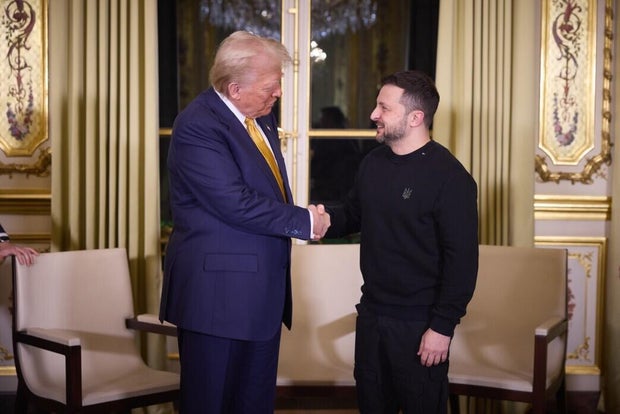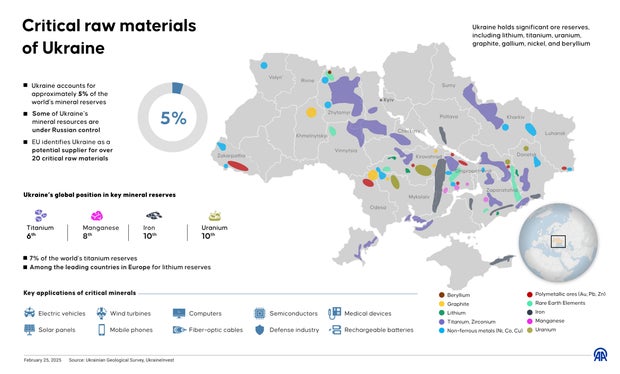A look at Ukraine’s minerals and rare earth elements, which Trump wants as payback for wartime aid

Exactly three years after Russia launched its full-scale invasion and under pressure from President Trump, a senior Ukrainian official said negotiations over a deal that would give Washington access to Ukraine’s vast mineral reserves were “in the final stages.”
Ukraine’s leaders have voiced hope that such an agreement might serve as the foundation of a long-term security guarantee for the country against any future Russian aggression, but the Trump administration has thus far remained non-committal, framing access to the resources as a way for Ukraine to pay the U.S. back for its support over the last three years.
“The negotiations have been very constructive, with nearly all key details finalized,” Olga Stefanishka, Ukraine’s Vice President for European and Euro-Atlantic integration, said in a Monday social media post, written in English. “We are committed to completing this swiftly to proceed with its signature. We hope both US and UA leaders might sign and endorse it in Washington the soonest to showcase our commitment for decades to come.”
Ukrainian Presidency/Handout/Anadolu/Getty
Often called Europe’s “breadbasket” thanks to its massive agriculture sector, Ukraine is also one of the continent’s most resource-rich nations. Much of Ukraine’s mineral reserves remain untapped, however, due to difficult access, old and undeveloped infrastructure and a lack of investment — all exacerbated by Russia’s ongoing offensive military campaign, which initially started in 2014 with its invasion and annexation of the Crimean Peninsula.
Roughly 20% of Ukrainian land — a vast swath of the eastern Donbas region plus Crimea — is now under Russian control. The occupied territory includes a significant portion of Ukraine’s mineral reserves, including highly sought-after rare earth elements
The ground beneath Ukraine is believed to hold about 5% of the world’s total reserves of rare earth elements. The U.S., which covers about 12 times as much ground, is estimated to have only 1-2% of the world’s rare earths, by comparison.
Omar Zaghloul/Anadolu/Getty
According to the Institute for the Study of War, about half of Ukraine’s rare earth element reserves lie in territory currently occupied by Russia.
Ukraine also has one of Europe’s biggest reserves of titanium. The strong, lightweight metal is a vital component in modern aircraft, missiles and countless other civilian and military hardware, from satellites to bicycles. Ukraine’s reserves are largely found in the northwest and central regions of the country, which have remained firmly under Kyiv’s control.
Lithium deposits, meanwhile, are scattered across Ukraine’s central, east and southeast regions — the latter of which are currently held largely by Russia. Lithium is a key component in the rechargeable batteries found in everything from electric vehicles to laptops and smartphones.
Ukraine also holds about 20% of the world’s global reserves of graphite. Commonly used in pencils, the soft substance is also used in industrial lubricants for motors and other machinery.
“We must have an agreement with Ukraine on critical minerals and rare earths and various other things as security. And I think that that’s happening. I think we’ve made a lot of progress,” Mr. Trump said during a joint news conference at the White House on Monday with visiting French President Emmanuel Macron.
“I think this discussion (a potential mineral deal) is a very important one,” said Macron. “First, because it’s important for the U.S. and it will be a good occasion for a first very important meeting between President Trump and President Zelenskyy. Second, I think it’s — there is a lot of economic upside on both sides.”
Mr. Trump has characterized U.S. access to Ukraine’s minerals as a way for the country to pay back Washington for the military assistance provided over the past three years.
U.S. industry currently relies largely on China, which is the world’s biggest source of rare earths and other minerals, for its raw materials. An increase in the supply of those materials from Ukraine could eventually mean a decrease in minerals purchased from China — and less concern from a national security standpoint.
While the details of the deal said to be taking shape have not been shared, Zelenskyy earlier refused to sign an agreement that reportedly would have given the U.S. access to about $500 billion worth of his nation’s mineral wealth — about half of its estimated future value.
“I won’t sign a document that 10 generations of Ukrainians will pay for,” Zelenskyy said over the weekend. He has stressed that any agreement to grant U.S. access to Ukraine’s minerals must come with security guarantees— including, he suggested Tuesday, the possibility of American forces deploying to protect American investments.
Zelenkyy’s chief of staff, Andrii Yermak, said Monday that Kyiv was considering investment opportunities with both the U.S and European countries, “which includes minerals, their development and extraction,” calling his country’s natural resources “a very important element that can work in the general structure of security guarantees — military guarantees and others.”
Mr. Trump has claimed the U.S. has given Ukraine $350 billion in assistance since the war started three years ago, and made it clear he wants to get that back.
Ukraine Oversight, a U.S. interagency watchdog group, says the U.S. has provided no more than $183 billion, however, and roughly a third of that was spent domestically in the U.S. to manufacture ammunition and other weapons and equipment to be used by Ukraine.
Mr. Trump has said he could meet with Zelenskyy at the White House this week or next to finalize a minerals deal.
https://assets2.cbsnewsstatic.com/hub/i/r/2025/02/19/a7bb8886-af9b-4710-92c1-e2556189ebeb/thumbnail/1200x630g2/bb4d94d21f31e7f0a88a9e1d6899bdee/gettyimages-2188205488.jpg?v=8530dec12e70cec71e9990a5fbc34391
2025-02-25 15:22:10







